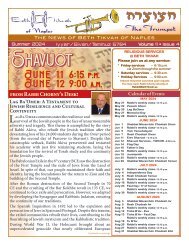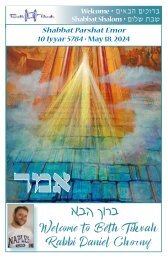You also want an ePaper? Increase the reach of your titles
YUMPU automatically turns print PDFs into web optimized ePapers that Google loves.
Welcome • ohtcv ohfurc<br />
Shabbat Shalom • ouka ,ca<br />
Shabbat Parshat <strong>Behar</strong><br />
17 Iyyar 5784 • May 25, 2024<br />
rvc<br />
A<br />
We extend our congregation’s sympathy to our friend<br />
Ruth Jason and her family on the loss of her husband<br />
Phil Jason k ”z<br />
May his Memory Be for a Blessing<br />
lurc urfz hvh<br />
Contributions may be sent to Beth Tikvah’s Chesed Fund.<br />
A
Yahrtzeiten<br />
May 25<br />
May 26<br />
May 29<br />
Anniversaries<br />
Judy Fant, Hannah Castro<br />
Eleanor Scheffler<br />
Jerry Bogo<br />
May 26 Judy & Ray Fant (33)<br />
May 28 Evelyn & Larry Hecht (63)<br />
Gail & Peter Sherer (46)<br />
May 31 Beth & Albert Blumberg (43)<br />
vfrck oburfz<br />
May 24 • 16 Iyyar Gerald Cohen – Relative of Janice Chartoff<br />
Oscar Grusky – Father of Fiona Welles<br />
Howard Cohen – Father of Jeanne Kagin<br />
May 25 • 17 Iyyar Samuel Brooker – Father of Donna Lee Brooker<br />
Rae Danoff – Mother of David Danoff<br />
May 26 • 18 Iyyar Joseph P. Silow – Father of Michael Silow<br />
Jeffrey Chizzik – Brother of Steve Chizzik<br />
Nina Cohen – Aunt of Gayle Chizzik<br />
May 27 • 19 Iyyar Cecilia Lipnick – Mother-in-law of Judith Lipnick<br />
Helen Kagin – Mother of Stan Kagin<br />
May 28 • 20 Iyyar Julius Snyder – Grandfather of Susan Schehr<br />
Birthdays<br />
jna `skuv ouh<br />
Shabbat Kiddush Sponsored by:<br />
Debra & Michael Silow<br />
In loving memory of Michael’s father<br />
k ” z<br />
Joseph P. Silow<br />
Beth & Albert Blumberg<br />
Thanking the Beth Tikvah community<br />
for its friendship and support<br />
Sharon & Gabriel Castro<br />
In honor of Hannah’s birthday<br />
Mavens: Steve Chizzik<br />
Assisted by: Fran Kaufman,<br />
Shep & Linda Scheinberg and Susan Wasserman<br />
Sponsor a Kiddush<br />
cuy kzn<br />
Contact Arleen Sivakoff: 239.455.8811 - dsivakoff@aol.com<br />
Contact Arleen Sivakoff: 239.455.8811 • dsivakoff@aol.com
Torah & Haftarah Readings:<br />
Shabbat Emor: Leviticus 25:29–26:2 (Cycle 2) (Etz Hayim p. 742)<br />
1. 25:29-34 2. 25:35-38 3. 22:39-43 4. 25:44-46<br />
5. 25:47-50 6. 25:51-54 7. 25:55-26:2 M. 25:55-26:2 (p. 745)<br />
Haftarah: Jeremiah 32:6–27 (p. 759)<br />
Torah Commentary<br />
D’var Torah:<br />
Resting In Chaos - Bex Stern-Rosenblatt<br />
On the seventh day of creation, God rested. For the seventh year, we read in<br />
our parashah, the earth rested. We might have expected the text to say that<br />
we rested during that seventh year. After all, we were the ones doing all the<br />
work on the earth for the previous six, reaping and sowing and pruning.<br />
Just as we read that God created for six days and rested on the seventh, we<br />
might expect to find that we transformed the wilderness to cultivated land<br />
for six years and rested on the seventh year. We stopped our work. But it is<br />
not for our sake that this Shabbat is observed. This seventh year will be a<br />
“Shabbat shabbaton for the earth, a shabbat for God.”<br />
We do have our own rest. We rest on Shabbat, the seventh day, just as God<br />
rested. And furthermore, the Jubilee year is for us. It is a reset for us, a return<br />
to the initial conditions of entering the land. Those who were enslaved are<br />
set free and we all return to our ancestral holdings. So why is the seventh<br />
year not a rest for us as well as the land? How might the case of the earth<br />
during the shmita year help us understand what God was doing during<br />
creation and Shabbat?<br />
The earth is an active character in the Tanakh. The earth cries and vomits,<br />
mourns and ejects. More than that, the Land of Israel plays a special role<br />
as home to God. Much of Leviticus has been devoted to explaining how to<br />
keep such a home from contracting impurity and how to cleanse it when it<br />
does. But even as the earth is an active character, even as the Land of Israel<br />
can act to save itself, the earth does no wrong in the Tanakh. The earth<br />
plays defense, but does not create, for good or for bad.<br />
So why does the earth need to rest? Or rather, what does it mean for the<br />
earth to rest? The work of the earth, as noted back in the first chapter of<br />
Genesis, is to bring out or produce vegetation. During the shmita year, this<br />
activity does not stop. Rather, humans stop interceding in it. The earth<br />
gives forth whatever vegetation it happens to give forth. In the sixth year,<br />
before shmita, the earth and the humans do have to work harder. Together,<br />
we have to produce enough food to last us all through the period of being
fallow. As noted by Jacob Milgrom, this extra work on the final year matches<br />
the great work of God on the final day, the creation of humans.<br />
The counting of these years begins when we enter the land. Before then,<br />
the earth did not need a shmita year. Perhaps, before then, the land was<br />
already effectively in a state of shmita. The land rested until we disturbed<br />
its slumber. The land hummed along contentedly, producing whatever<br />
vegetation it happened to produce, until we showed up with our vines and<br />
our seeds.<br />
The word for earth, for land, shows up before creation. We read that the<br />
earth was tohu vavohu, vast and void, chaotic emptiness. God’s creation,<br />
God’s acts of separation, of seeing, of naming, turn the earth into an active<br />
character. And perhaps, it is from these acts that the earth too needs to rest.<br />
God rests and we rest once a week. We are the ones changing the face of<br />
reality. But every seven years, the earth needs to rest as well. The earth needs<br />
to drift back towards that state of tohu vavohu. The earth needs a moment,<br />
a year, of rest in the spirit of the flood which once covered it up, destroyed<br />
it, protected it from us, and returned it to its watery origins.<br />
Likewise, for us and for God, we rest. We return to the beginning. We go back<br />
before creation. For both of us, the story starts with speech. Immediately<br />
upon existing, we are naming, dividing, creating, giving meaning. Shabbat<br />
invites us to dip back into the vast and void and trust that the current will<br />
carry us to a fruitful new week.<br />
✺ Join Rabbi Chorny<br />
for his weekly discussion<br />
group, Tuesdays at<br />
12:15 p.m. via<br />
and IN Person<br />
Beth Tikvah of Naples<br />
1459 Pine Ridge Road<br />
Naples, FL 34109<br />
239 434-1818<br />
Visit us online at<br />
bethtikvahnaples.org<br />
or scan the QR code

















